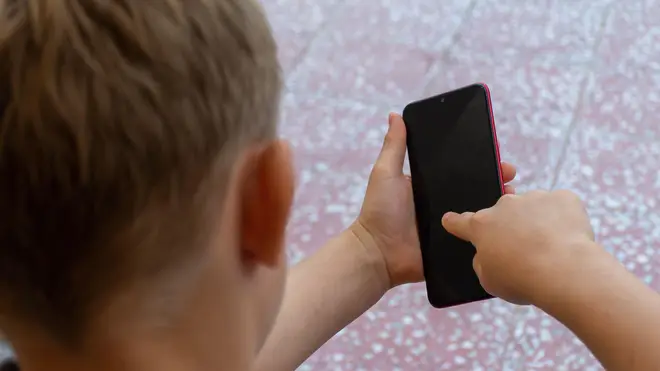
Clive Bull 1am - 4am
6 February 2024, 00:04

Two studies released to mark Safer Internet Day warn of the impact such content is having on teenagers, particularly young boys.
The majority of boys aged 11-14 have been exposed to online content that promotes misogyny and other harmful views, according to research.
New research commissioned by Vodafone to mark Safer Internet Day found that 69% of boys had encountered posts promoting misogyny, with 70% of teachers saying they had seen a rise in sexist language in the classroom over the last year.
It said 42% of parents have heard their sons make inappropriate comments because of what they have seen online, including comments that were sexual, violent or degrading about women and girls.
The study warned that AI-powered algorithms pushing content to boys online was a key part of the problem, with the research indicating that such content was often being seen when users were searching for other, innocent material, such as fitness or gaming content.
The research included a survey, carried out by Opinium, of 1,000 parents and boys aged 11-14, as well as more than 4,000 teachers.
Vodafone and children’s charity the NSPCC have created a new online toolkit in conjunction with children and parents to support families in having conversations about online safety.
The mobile operator has also launched a campaign alongside charity Global Action Plan, which calls for “safety by design” to be prioritised by new online safety regulator Ofcom as it begins to implement the Online Safety Act.
Nicki Lyons, chief corporate affairs and sustainability officer at Vodafone UK, said: “Every parent knows being online is part of everyday life for kids today – but it’s imperative we don’t miss the boat on AI when it comes to baking in safety at the start of the journey.
“This Safer Internet Day we have chosen to raise awareness of this issue and support Global Action Plan in their call for a safer internet. We’ve also created a new toolkit in partnership with NSPCC to help parents navigate the online world. We’ve been active in the digital parenting space for 14 years and we’re committed to doing more in the future.”
Vodafone’s research comes as another study, conducted by University College London (UCL), the University of Kent and the Association of School and College Leaders (ASCL) also found that social media algorithms were amplifying misogynistic content to teenagers.
Through interviews with young people and school leaders, the researchers also found that hateful ideologies and misogynistic tropes had moved offline and into schools and were becoming embedded in youth culture.
The study’s principal investigator Dr Kaitlyn Regehr said “algorithmic processes” on social media sites “target people’s vulnerabilities” and “gamify harmful content”.
“As young people micro dose on topics like self-harm, or extremism, to them, it feels like entertainment,” she said.
“Harmful views and tropes are now becoming normalised among young people. Online consumption is impacting young people’s offline behaviours, as we see these ideologies moving off screens and into school yards.
“Further, adults are often unaware of how harmful algorithmic processes function, or indeed how they could feed into their own social media addictions, making parenting around these issues difficult.”
Over the weekend, the mother of murdered teenager Brianna Ghey called for social media apps to be banned on smartphones for under-16s, and for searches for inappropriate material to be flagged to parents.
One of Brianna’s killers, Scarlett Jenkinson, who was 15 at the time of the murder, had watched videos of torture and murder online.
New research from the UK Safer Internet Centre found that about three quarters of parents and carers (74%) had worries about safety as advances in technologies such as AI, virtual reality and new social media apps continue to accelerate.
But as well as support for parents, NSPCC chief executive Sir Peter Wanless said it was important young people were also given a voice on online safety.
“We’re pleased to support Safer Internet Day again this year and recognise its importance in raising awareness for a safer internet for young people, encouraging everyone to play their part,” he said.
“Today’s children are the first generation to be truly growing up online, but decisions about the online world are still being made without them.
“And while technology is more popular than ever, avoiding online harm has become more complicated. This year’s theme of young people inspiring change draws attention to the importance of adults listening to and acting on the valuable insights and expertise of children.
“If we are to ensure that every child is safe online then we need to give children a voice on what that safety looks like to them.
“We’re committed to this within our own work at the NSPCC, amplifying the voices and experiences of children and young people to help keep them safe online.”
Vodafone and the NSPCC’s toolkit for families can be found at https://vodafone.co.uk/digitalparenting .